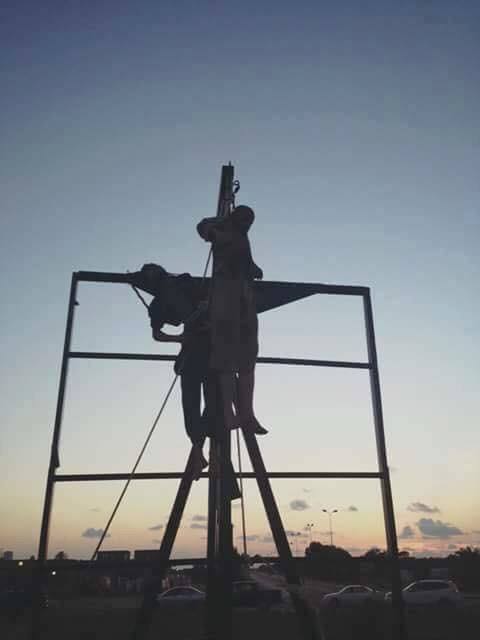By Aiman Mufta, Adam Ali and Ajnadin Mustafa.

Benghazi/Tripoli, 14 August 2015:
Islamic State (IS) forces have taken Sirte Residential District . . .[restrict]No. 3 today, Friday, and started executing young men in the area, mainly members of the Farjan tribe, according to sources in the town. Confirming the reports, a source at Ibn Sina hospital said that bodies, of women as well as men, shot in the head, execution style, had arrived there. Photos of others, “crucified” by IS have been circulating on social media. Other reports speak of 12 decapitated bodies being found near a school in No. 3 district.
There are also unconfirmed reports of the a medical centre in the district which was treating some of the wounded in the fighting being attacked and set on fire by IS.
The sources in Sirte claims that in the three days of fighting as many as between 100 and 160 people in District No. 3 died in the clashes, most of them members of the Farjan tribe. Others put the figure at 70. To escape the fighting, residents in the town are also said to have been fleeing, some reportedly toward Bani Walid.
One source has said that the IS have threatened to demolish the homes in District No. 3 of Farjan members. It is also reported that the Cordoba Mosque in the district has been taken over by IS and renamed “Masjid Abu Musab Al-Zarqawi” after the Jordanian militant who was leader of Al-Qaeda in Iraq from 2004 until he was killed in a targeted US air raid in 2006. The mosque was central to the outbreak of this week’s fighting. The uprising was sparked by the murder on Tuesday by IS of its Salfist imam, Khalid bin Rajab Ferjani. He had refused to hand it over to IS.
District No. 3, with is large Farjani population, had been beyond IS’ control since the Islamists took the town.
For its part, the Libyan government has accused the international community of ignoring the killings in Sirte and of betraying Libya.
Abdullah Al-Thinni, whose resignation as prime minister on Tuesday appears to have evaporated, accused IS of genocide and called to the international community to help Libya to crush the organisation. He criticised the ban imposed by the Security Council on the supply of arms to Libya as being partly to blame.
It has been widely reported that those who were fighting IS in Sirte had nothing more than Kalshnikovs as weapons, while IS enjoyed the the use of massive heavy weaponry.
In a statement on the government’s Facebook page, Thinni said the international community had a moral responsibility for what had happened, accusing it of double standards – being prepared to fight IS in Iraq and Syria, but turning a blind eye in Libya.
Libya’s UN ambassador Ibrahim Dabbashi also demanded that the Security Council to act against the “unprecedented crimes” committed by IS in Sirte.
So far there has been no comment from any foreign government or international organisation about the situation.
As for the response of the authorities in Tripoli, the president of the continuing General National Congress, Nuri Abu Sahmain, has asked the military prosecutor to investigate the withdrawal from Sirte of Misrata’s Brigade 166 and other units in May.
Despite an announcement to that effect, Misratan forces have not arrived to relieve the town.
In Tobruk, Sirte member of the House of Representatives Abu Bakr Al-Ghazali called on all the people of Sirte to unite and “eradicate the Kharijites and the corrupt on earth”. (The Grandi Mufti of Saudi Arabia has labelled IS supporters as Kharijites, an 7th century Islamic heresy.)
IS, Ghazali said, had gone too far in Sirte with its “killings, torture and slaughter of the innocent and the poor who are powerless.” He called on Khalifa Hafter, the commander general of the Libyan armed forces, to back the uprising in Sirte by providing arms and equipment before it was too late.
The Libya air force has carried out raids against IS target in Sirte but to little effect. [/restrict]









